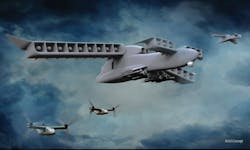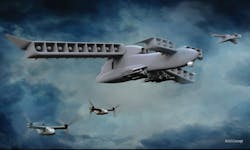Uber in the air: Aurora transitions X-Plane technology to commercial eVTOL on-demand aircraft with Uber Elevate
MANASSAS, Va. Engineers at Aurora Flight Sciences in Manassas, Virginia, are transitioning technology they developed for the Defense Advanced Research Projects Agency (DARPA) Vertical Takeoff and Landing Experimental Plane (VTOL X-Plane) program to commercial applications, including expanded research into commercial electric VTOL (eVTOL) systems with the potential to bring Uber to the skies.
“Growing private capital investment in electric aircraft has quickly accelerated the timeline of point-to-point VTOL travel within the commercial space,” Aurora Chief Technology Officer Tom Clancy says. “DARPA has always been at the forefront of technological advancements, and the success of this ambitious project has the potential to redefine the world we live in.”
The company’s XV-24 subscale vehicle demonstrator (SVD) achieved several aviation milestones, officials say, including:
▪ Distributed electric propulsion ducted fans,
▪ An innovative synchronous electric-drive system,
▪ Both tilt-wing- and tilt-canard-based propulsion for vertical takeoff and landing,
▪ High efficiency in both hover and high-speed forward flight.
These milestones advanced the concept of distributed electric propulsion applied to Aurora’s eVTOL on-demand aircraft, which is being developed in partnership with Uber Elevate, officials say.
“When DARPA launched the idea of distributed electric propulsion in 2013, it was a novel concept. Today, it is widely accepted as the catalyst to a sophisticated electric air transportation ecosystem,” Aurora Founder and CEO John Langford affirms. “Expanding on DARPA’s vision, we now have an unprecedented opportunity to take this groundbreaking capability to completely new markets.”
Aurora Flight Sciences, a Boeing company, is a technology company that strives to create smarter aircraft through the development of versatile and intuitive autonomous systems. Operating at the intersection of technology and robotic aviation, Aurora leverages the power of autonomy to make manned and unmanned flight safer and more efficient, officials say.
Headquartered in Manassas, Virginia, Aurora has more than 550 employees and operates in six locations, including research and development centers in Cambridge, Massachusetts, and Luzern, Switzerland; manufacturing facilities in Bridgeport, West Virginia, and Columbus, Mississippi; and offices in Dayton, Ohio, and Mountain View, California.



